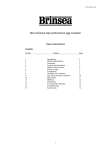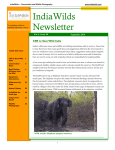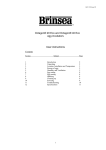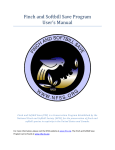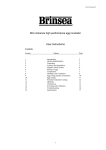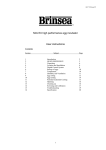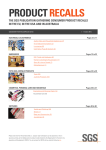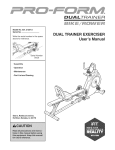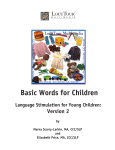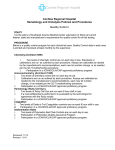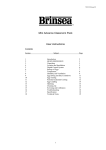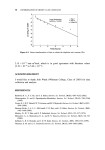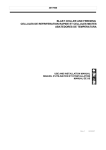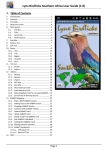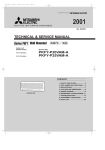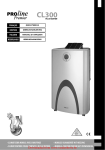Download Exact Educational Reference Guide
Transcript
Educational Reference Guide The exact Feeding Program for a Healthier Pet The exact Feeding Program for a Healthier Pet ® KAYTEE® exact has been the recognized nutritional leader by avian veterinarians and breeders since its introduction in 1989. Developed by the nutritional experts at the Kaytee Avian Education Center, exact is the most researched and widely used extruded food available. Scientifically formulated for each specific specie, exact provides complete and balanced daily nutrition and is 100% consumable. Educational Reference Guide And because of our commitment to provide the highest quality food for birds and small pets, we continually improve and enhance our products. It is our mission to deliver the best and most nutritionallybalanced formula for a pet’s optimum health and well-being. This is the “exact promise”. Table of Contents Page The Differences in Avian Diets...............................................................................................................02 The Research Behind exact...................................................................................................................03 exact Advantages...................................................................................................................................04 The exact Product Family......................................................................................................................05 Hand Feeding.........................................................................................................................................06 Formula Preparation.......................................................................................................................07 Feeding Instructions.......................................................................................................................08 Monitoring a Hand-Fed Baby Bird..................................................................................................09 Weaning.................................................................................................................................................10 Weaning Tips..................................................................................................................................11 exact Adult Daily Diets...........................................................................................................................12 exact Breeder Diets................................................................................................................................13 Converting to an Extruded Food............................................................................................................14 Conversion Tips..............................................................................................................................15 Droppings..............................................................................................................................................16 Product Storage.....................................................................................................................................17 Appendix A – Body Condition Score Card.............................................................................................18 Appendix B – Hand-Feeding Chart.................................................................................................. 19-20 KAYTEE Products, Inc............................................................................................................................21 The Research Behind exact The Differences in Avian Diets ® Seeing the benefits of an extruded diet for birds and bird owners, KAYTEE® field-tested exact for five years prior to the product being released, on more than 4,000 birds, and conducted research with breeders, avian veterinarians, bird enthusiasts and pet owners. Research showed using KAYTEE exact starts birds on a lifetime of good health and healthy eating habits. BIRD Species TESTED ON exact (All fed exact adult diets) Avian veterinarians and breeders have long understood that at least 75% of the health problems they encounter in birds are directly related to poor nutrition. Feeding birds used to be a nutritional guessing game. Understanding these nutritional issues, KAYTEE® began formulating an extruded food now known as exact®. How does exact, an extruded food, compare with the other avian diets available? In general, avian foods can be placed into one of three categories: “Extruded”, “Seed-based” or “Pelleted.” What is extruded? Seed-Based Diets • Extruded foods have been proven to provide superior 100% complete nutrition when compared with seed or pelleted diets • Your pet may only choose the certain seeds or shapes that it likes, which may not provide the necessary nutrition required • Combine quality ingredients and nutrients to produce a processed nugget that contains precise levels of each required nutrient • Many important nutrients are left in the dish • No matter what your pet chooses to eat, each nugget contains exactly the same amount of proper nutrition (birds choose their seeds by preference, not necessarily nutrition) • Extruded foods do not contain seed hulls, creating less mess during clean up and making it a better nutritional value at retail • Notoriously poor sources of vitamins and minerals • Supplementing with fruits and vegetables is generally unsatisfactory • May also be high in fat or contain poor quality nutrients Pelleted Diets • Poor acceptance • Poor palatability • The tendency to produce wet, foul-smelling droppings There are nutritional and physical differences between what is called a “pelleted” diet and an “extruded” diet. Pelleted diets are bound together using compression at low temperatures, which can cause higher bacterial counts, provide moderate digestibility and can generate dust. Extruded foods are bound at high temperatures, which pasteurizes ingredients resulting in lower bacterial counts and dust, while improving digestibility and taste. Canaries * Finches Gouldian* Java Rice * Zebra * Society * Shafttails* Orange Weaver Spice Strawberry Nun Parakeets Lovebirds Budgerigar *+ Scarlet Chested*+ Ringneck*+ Alexandrine *+ Princess of Wales *+ Quaker *+ Rosella *+ Peach Faced *+ Masked * Cockatiels*+ Conures Sun *+ Jenday*+ Red Masked *+ Blue Crown * Nanday* Peach Front *+ Half Moon Maroon Bellied *+ Green Cheeked + Dusky + Queen *+ Pionus Blue Head *+ Maximillian Dusky White Crown *+ Parrots Blue Front *+ Yellow Naped*+ Double Yellow Head *+ Orange Wing *+ Red Head *+ Spectacle *+ Hispanola*+ Blue Cheek Cubans Yellow-Shouldered + Hawkheaded African Grey *+ Timneh+ Meyer *+ Senegal *+ Jardine*+ Eclectus Grand *+ Red Sided *+ Vosmaeri*+ Soloman Island *+ Lories Moluccan (red) *+ Dusky + Chattering + Rainbow + Blue Streak + Cockatoos Umbrella *+ Moluccan*+ Greater Sulfur Crested + Medium *+ Lesser+ Citron *+ Goffin*+ Rose Breasted * Bare-eyed Ducorps Slenderbill White-tailed Black Black Palm Macaws Softbills Blue & Gold *+ Scarlet *+ Greenwing*+ Hyacinth + Military + Red Front + Caninde+ Hahns*+ Yellow Collared *+ Severe*+ Illinger*+ Mynahs *+ Toucan + Toco Sulfur Breasted Keel-billed + Touracos+ * Bred on exact + Hand-Fed with exact Laboratory and field tests conducted prior to product being released to market. Since this time, virtually every avicultural species has been maintained, bred and/or hand-fed on the exact products with excellent results. For further information, call the KAYTEE Helpline toll-free: 1-800-KAYTEE-1. 02 | K A Y T E E e x act E ducati o n a l R efere n ce G uide K A Y T E E e x act E ducati o n a l R efere n ce G uide | 03 exact ® Research Since the introduction in 1989, research has continued analyzing the long-term performance, growth and metabolic studies ensuring that exact meets the nutritional needs of birds and small animals. exact was designed to meet the two main concerns of pet owners: Nutrition and Mess exact Nutrition exact never leaves nutrition to chance. It has nutritionally balanced formulas developed specifically for each bird type. Levels of protein, vitamins, minerals and amino acids are measured to provide optimum nutrition to meet each bird’s dietary requirements. It is designed to be the only food your pet needs, and since each nugget is exact, no nutrients go uneaten. • NEW DHA Omega-3 to support heart, brain and visual functions • NEW Chelated Minerals to promote healthy fur and feathers • NEW L-carnitine to improve metabolism and stimulate the immune system • Antioxidants to help general health and immune support • Prebiotics & Probiotics to aid in digestive health • All extruded diets are naturally preserved No Mess—Better Value exact is 100% edible. There are no seed hulls to scatter, so less food is discarded and, many times pound for pound, a better “nutritional” value at retail. exact Advantages •Complete Nutrition Every bite of exact is fortified and balanced for optimal nutritional intake and better health. •No Mess, Less Waste You will notice no mess and less waste when using exact. With seed diets, favorite seeds are usually selected, leaving less preferred items behind and often scattered out of the food dish. •Totally 100% Consumable Seed diets include 10-40% hulls, which are left uneaten. Every bite of exact is edible. •Specie Specific Formulated Diets Scientifically formulated to be the only diet for specific bird types and stages of life, but allows for up to 20% fruits, vegetables or seeds to be added for variety. •Ideal for Breeding exact contains all essential nutrients for better fertility, hatching and growth of chicks. •Ideal for Hand-Feeding Baby Birds exact Hand Feeding Formula promotes faster growth, brighter plumage, better health and faster weaning. •Firm Droppings exact promotes firm droppings in healthy birds. exact® Hand Feeding Formulas (Hatch to Weaning) • The cornerstone of the exact Feeding Program guarantees that you are starting your bird off right. Designed to nurture baby birds through the most critical stages of their lives. exact® Conversion (Weaning to Adult) • The easiest way to convert your bird from a seed diet or during weaning to exact nutrition. exact® Natural (Adult) • Each crunchy nugget is specially designed to provide exact nutrition with natural colors and natural preservatives. exact® Rainbow® (Adult) • An enticing rainbow of colors, aromas and shapes, you can be assured they are getting exactly the right nutrition while adding a little excitement to feeding. • exact Rainbow is also available for Rabbits & Guinea Pigs. exact® Natural Breeder & exact® Rainbow Breeder (Adult) •Easy Weaning Compatible tastes makes weaning from exact Hand Feeding Formula to exact adult diets easy. • Supports critical nutritional demands of actively breeding pairs and pairs rearing chicks • Improved Digestibility Extrusion (cooking) means more nutrients are absorbed. exact® Organic™ (Adult) • Economical exact is less expensive than seed diets because there is less waste, and no supplements are required. We’re sure you’ll agree, exact is exactly what your bird needs! 04 | K A Y T E E e x act E ducati o n a l R efere n ce G uide The exact Product Family ® • Certified organic ingredients and processes that are free of chemical treatments or preservatives creating a naturally pure product using earth-friendly means. Today, we can say with confidence that exact is, and continues to be, the most thoroughly researched bird food on the market. exact was researched and tested for five years prior to its introduction in 1989. Research continues at the Kaytee Avian Education Center, studying the nutritional needs of pet birds. This assures that each exact product delivers the best nutrition possible. K A Y T E E e x act E ducati o n a l R efere n ce G uide | 05 Hand Feeding exact ® Hand Feeding Formulas KAYTEE® discovered that almost half of all breeders used a homemade hand-feeding formula, which encouraged KAYTEE to develop exact Hand Feeding formulas. Before exact, there was no trusted, leading brand of commercial hand-feeding formula on the market. KAYTEE tested exact on more than 2,000 hand-fed baby birds, representing more than 50 species. Today, exact Hand Feeding Formula is recognized as the first “instant” formula available and is the most researched and respected product used by professional breeders, veterinarians and conservation programs throughout the world. exact Hand Feeding Formula is the cornerstone of the exact system. Starting a baby bird on exact Hand Feeding Formula makes weaning onto an adult form of exact easy, and guarantees a life of good nutrition. exact Hand Feeding Formula is designed to nurture baby birds through the most critical stages of their lives, from hatch, through pinning, feathering and weaning, when body weight doubles and triples in weeks. exact’s balanced, nutritionally complete formula helps baby birds grow faster, wean earlier and develop better, brighter plumage than similar birds fed homemade formulas. exact’s high nutrient levels reduce the necessity of overnight feedings, and when used properly, will not cause crop slowdown. exact Hand Feeding Formula contains probiotics and prebiotics to encourage a healthy population of intestinal microorganisms. The selected species have been chosen specifically for their vitality, stability and overall benefits to a bird’s system. Starting Your Baby Bird on exact ® exact is scientifically formulated to provide balanced nutrition for young birds and takes the guesswork out of meeting their needs. No additional vitamin or mineral supplements are required. A diet of exact supplies chicks with all the proper nutrients needed to promote superb conditioning and excellent health. Start your baby bird on exact from hatch or when removed from the nest. Be sure to follow the directions precisely. The instructions included with every package of exact Hand Feeding Formula are the most complete in the industry. For tips on preparation and hand-feeding, log on to kaytee.com to view the exact Hand Feeding video. While not necessary or encouraged, you may add fruits and vegetables (such as strained baby foods) to exact Hand Feeding Formula, but these additions should not exceed 20% of the total diet volume. Formula Preparation As with any job, having the right tools is critical. You will need a gram scale, feeding syringes, thermometer and a heat source such as a brooder or an aquarium with a heating pad, paper towels, a record-keeping system and proper disinfectant. exact Hand Feeding Formula for Macaws was developed as a result of Kaytee Avian Education Center studies which showed Macaws, Eclectus and Hawkheads perform better on an increased energy diet. By adjusting levels of protein, vitamins and minerals, exact Hand Feeding Formula for Macaws provides ideal growth and feathering due to elevated energy and fatty acid levels. It also works well with all new hatchlings and other high energy needs babies, such as cockatiels and conures. exact Hand Feeding Formula is easy to prepare and use, but there are several important requirements to keep in mind. When mixed with hot water, exact Hand Feeding Formula produces an instant formula with low bacterial levels. Use the following feeding chart to mix formula according to the chick’s age. It is always advised to weigh formula and water to assure proper concentrations. Volume measurements are less accurate but usually sufficient. Volume Weight Age (days) exact water exact water Hatch – 2 days 1 part 6 parts* 8% 92% 2 – 5 days 1 part 2-3 parts 16-20% 80-84% 5 – weaning 1 part 1 1/3 – 2 parts 25-30% 70-75% *An electrolyte solution may be substituted for the first two days only, but is not necessary. Combine exact Hand Feeding Formula only with pure, uncontaminated hot water (approximately 120°F). Your tap water may contain harmful bacteria, so testing may be required. If you are unsure of the water’s quality, always boil it first for at least 10 minutes, and then allow to cool to approximately 120°F before adding to the dry formula. Use a clean, sanitized container and mix the formula with hot water, stir thoroughly and allow to sit for about one minute. Cool the mixture to a temperature between 102°F - 110°F (39°C – 43°C) before feeding. Ideally, a thermometer should be used to check the formula temperature. Testing on the back of your wrist, as with human infant formulas, can be done but is less accurate. For hatch to 2 days old – formula should be made in small quantities and thoroughly stirred before feeding. Separation at this concentration is expected and is not a problem at this early stage because primary requirements are for water and water soluble nutrients. exact has a certain water binding capacity. After this is achieved, additional water will tend to separate out, such as at the 1:6 solution. Simply stir thoroughly and often to prevent food and water from separating prior to feeding. After chick is two days old, the food concentration must be increased (see feeding chart). After five days of age – formula should be the consistency of creamy pudding. Stir thoroughly before feeding. If a smoother consistency is desired, stir product vigorously at this time, which aids in activating added enzymes. Digestive enzymes (amylase and protease) are included to insure adequate digestion of carbohydrates and proteins. These enzymes are of particular value in a newly hatched baby or in a bird experiencing digestive difficulties. 06 | K A Y T E E e x act E ducati o n a l R efere n ce G uide K A Y T E E e x act E ducati o n a l R efere n ce G uide | 07 Special Notes for Preparation •IMPORTANT – DO NOT REUSE MIXED FORMULA!! It is important to discard all unused mixed formula after every feeding to prevent bacterial growth. Mix fresh at each feeding. • Microwaving should be avoided. Microwaving can create “hot spots” in the formula and increase the likelihood of accidental crop burns. If required, limit microwaving (on high) to no more than 5 seconds per 1/2 cup of mixed formula at a time. Be sure to follow this with vigorous stirring before retesting the temperature and feeding. Cover large batches of formula while microwaving to avoid a moisture loss. CRITICAL FEEDING TIP Always place the syringe on the left side of the chick’s mouth and dispense food to the right side of the pharynx. That is where the chick’s esophagus, or feeding tube, is located. If you place the syringe on the right side of the mouth, it is pointed toward the trachea, or wind pipe, and aspiration of food could occur causing suffocation. Feeding Instructions Feed the mixture using a clean, disinfected syringe, spoon or tube for each baby. Ideally, a separate syringe should be used for each chick to prevent the possible spread of disease. The best syringes are all plastic, which makes them both inexpensive and disposable. Always be sure to disinfect feeding equipment before use. 08 | K A Y T E E e x act E ducati o n a l R efere n ce G uide At the Kaytee Avian Education Center, two disinfectants are used alternately to clean, disinfect and store feeding syringes. These are used on alternate months so bacteria and viruses cannot effectively establish a resistance to either. Diluted bleach solution may be used if disinfectants are unavailable. Always rinse syringes thoroughly after they are removed from the disinfectant. Residue will be harmful to babies. Chlorhexidine, although commonly used, is not an effective avian disinfectant. exact Hand Feeding Formulas are designed to be the only food for baby birds. Additions to the diet may include fruits and vegetables (such as strained baby foods) but should not exceed 20% of the total diet. No additional vitamin or mineral supplements should be added. Monitoring a Hand-Fed Baby Bird STIR FORMULA THOROUGHLY TO AVOID BURNING THE CROP. Always test formula and cool the mixture to approximately 105°F to assure proper temperature before feeding. Baby birds should be fed on a routine schedule allowing the chick’s crop to empty (or nearly empty) between feedings and to determine if bird is being fed the right amount. This prevents any food remaining in the crop too long and possibly spoiling. It is advisable to allow the baby bird’s crop to completely empty at least one time a day. If the time between crop emptying suddenly increases, and the crop appears to be slowing down, observe the chick closely. See “IMPORTANT NOTES” regarding crop slow-down (Page 9). Always clean and sanitize all feeding equipment after use, and clean any spilled food off the chick. Good hygiene is critical for a baby bird’s health. Baby birds need time to build a healthy immune system. They are especially susceptible to bacteria, yeasts and viruses, so proper disinfectant use and chick cleanliness is essential. It is best to dispense the food along with the chick’s natural feeding response (rhythmic bobbing motion). This decreases the likelihood of any formula being inhaled. Feed until the chick’s crop is nicely rounded, or on older chicks, until it refuses more food. Generally, each meal should consist of a volume equivalent to 10–12% of the bird’s body weight – and up to 15% for small birds like Cockatiels. (For example, about 50 or 60 milliliters of mixed formula would be fed to a 500 gram baby). Do not overfeed, as this may result in regurgitation and possibly aspiration, which may cause death. Monitoring weight gain and loss is the best way to identify a problem before it becomes visibly obvious. Weigh and record the baby’s weight every morning before the first feeding. (Please use the exact Hand-Feeding Chart found in Appendix B to record daily weights.) A simple gram scale, such as a kitchen or diet scale is sufficient. A healthy chick should gain weight every day until it begins the weaning process. If weight gain stops, but weight is maintained, watch the bird closely. Loss of weight indicates a problem and should be investigated immediately. Call your avian veterinarian for more information. An otherwise healthy bird may not gain weight simply because it is not receiving enough nutrients. This could happen if: • The hand-feeding formula is not thick enough (contains too much water) • The formula is diluted with other ingredients • The bird is not fed often enough IMPORTANT NOTES •DIET CHANGE: For babies previously fed another hand-feeding preparation, a minimum of 24 to 48 hours is recommended for the dietary changes. During this period, both products should be prepared separately (as directed) and mixed together, with the exact Hand Feeding Formula slowly being increased in proportion until the previous diet has been eliminated. An immediate conversion to exact Hand Feeding Formula may cause crop slow-down due to the dietary change. Use a more diluted formula the first couple of feedings in an attempt to prevent this. •CROP SLOW-DOWN: If crop slow-down should occur, first check for proper environmental temperature, as this is a frequent cause of crop problems. Then mix equal parts of prepared exact Hand Feeding Formula and infant applesauce, or provide additional water by preparing exact at the ratio of one part exact to two or three parts water. Provide this mixture for approximately 24 hours and then slowly return to the normal concentration of exact over an additional 24-hour period. During this time, massage the chick’s crop gently to break up any food aggregates that may develop. Never massage the crop when it is more than half full. Allow the crop to empty before feeding again. This method will quickly allow the gastrointestinal tract to stabilize and become fully functional again. The appearance of dark green droppings in a hand-fed baby may indicate a temporary shut-down of crop emptying (or the lack of food in the digestive system). If this occurs and the crop contains food, the rate of crop emptying should be immediately evaluated. If no improvement is noted within 36 hours, professional assistance is advised. •Volume of up to 15% body weight per meal may be provided, but may induce regurgitation in some birds. If regurgitation occurs due to overfeeding, stop feeding, clean food off baby and do not handle. Reduce meal volume at next feeding. • The chick does not get enough food at each feeding Droppings are a good indicator of digestive functions. Please refer to page 16 for further explanation. K A Y T E E e x act E ducati o n a l R efere n ce G uide | 09 Weaning The final difficult stage for baby birds is the weaning process. A chick may lose up to 10% of its body weight during this time as it begins to eat an adult diet, learns to explore its environment and develops the ability to fly. When “exploration” begins, offer adult food such as exact Conversion, exact Natural, exact Rainbow® or exact Organic™ in a clean food cup in addition to routine hand feeding. The baby bird will slowly begin to prefer the new forms of food. exact Conversion is preferred during weaning due to the higher nutrient content. Provide fresh water daily. Birds fed exact Hand Feeding Formula wean easily onto the exact adult foods because of compatible tastes and ingredients. The exact program is designed to reduce stress on both the baby bird and their hand-feeders. KAYTEE encourages exact users to call our toll-free KAYTEE Helpline whenever a question or concern arises. This number is printed on every KAYTEE product. For product information, visit us online at kaytee.com. KAYTEE Helpline: 1-800-KAYTEE-1 Weaning Tips Weaning is a natural process, but is often the most difficult time in a young bird’s life because it is learning to eat as an adult and become self-sufficient. exact has unique shapes which stimulate the baby’s natural curiosity and tactile (touch) receptors in the mouth. • As the baby bird begins to explore its environment, offer exact in a dish with a separate dish of water available. • When the baby moves to one hand feeding per day, hand-feed only at night so the baby has all day to investigate its new food. A very small amount of exact Hand Feeding Formula may be given in the morning to stimulate appetite. • Moisten exact with warm water or fruit juice to further assist the bird in weaning. Remove moistened product within 2 - 4 hours to prevent spoilage. • Offer exact by hand to encourage trial. It can also be mixed with exact Hand Feeding Formula. This combination may be offered in a bowl or fed directly by spoon. • Small amounts of millet, vegetables and fruits may also stimulate independent feeding when offered with exact. • *When weaning on to exact Conversion or Rainbow diets, do not be alarmed if the bird’s droppings have some coloring to them; however, the consistency should remain the same. The chart below indicates typical weaning ages. **They may vary by plus or minus 2 weeks (or possibly more), depending on feeding volumes, health and other factors. APPROXIMATE WEANING AGES Bird Macaw (Medium, Large).........................................................................16 Cockatoo (Umbrella, Moluccan)....................................................12 to 14 Macaw (Mini)..........................................................................................12 African Grey.............................................................................................12 Eclectus...................................................................................................12 Amazon Parrot........................................................................................12 Pionus......................................................................................................10 Quaker/Monk . ........................................................................................10 Ringneck (Indian, African)......................................................................10 Conure..............................................................................................8 to 10 Cockatiel.............................................................................................7 to 8 Parakeet..............................................................................................5 to 6 **Weaning Age (Week) To evaluate weaning status, gently check the crop of birds for food particles as evidence of consumption. Also, carefully observe droppings. These should remain olive brown and of similar consistency* as when the baby was hand-fed. Dark green, scant droppings generally indicate a lack of food in the digestive tract. If this occurs, continue or increase the level of hand-feeding as necessary. Weaning birds generally lose approximately 10% of their pre-weaning body weight. 10 | K A Y T E E e x act E ducati o n a l R efere n ce G uide K A Y T E E e x act E ducati o n a l R efere n ce G uide | 11 exact ® exact Adult Daily Diets All of the exact adult foods (exact Rainbow®, exact Natural, exact Organic™, exact Rainbow Breeder and exact Natural Breeder) are nutritionally complete diets designed and tested to be the only food your pet needs. Birds eating exact have better color, attitude and overall health. exact Natural – the “gold standard” in nutritional bird foods. Researched since 1985, exact Natural ensures that birds receive all the nutrients necessary for excellent health and reproduction. Not only is exact Natural a superior diet, but it’s also economical to use. Because exact is a high-nutrient, completely consumable diet, each bird will eat up to 1/3 less food than when on a seed diet. exact Natural contains natural colors, flavors and preservatives and is designed to require no costly supplements. Nothing beats the original – exact Natural. exact Rainbow – originated from the need to provide a visually dynamic extruded food. exact Rainbow is exciting and stimulating for birds to eat, and fun for bird owners as well. The FDA approved colors reflect the preferences of more than 4,000 birds that were tested at the Kaytee Avian Education Center. exact Rainbow is guaranteed to provide the exact nutrition birds need. You may add fruits, vegetables and treats, but these additives should not exceed 20% of the total diet to prevent dilution of nutrients and absorption of nutrient balance. Every bite of exact Rainbow has exactly the right nutrition, making feeding fun and easy. exact Organic – is “Certified” to ensure that methods of growing and processing ingredients utilize the earth’s natural resources. The ingredients and processes used are free of chemical treatments or preservatives. The end result is a naturally pure product using earth-friendly means. The same 100% nutrition you have come to know and trust from exact, with a natural approach. exact Natural, exact Rainbow and exact Organic are designed to support normal bird activity, including molting, growth and occasional breeding. All three formulas can be used for weight reduction on obese birds that were previously fed other diets. exact PRODUCT SELECTION FOR DIFFERENT SPECIES Cockatiel Parakeet/Lovebird Canary/Finch Mynah/Toucan Breeder Diets exact Natural Breeder and exact Rainbow® Breeder are unique formulas developed specifically for actively breeding pairs. They support high-production breeding, when multiple clutches are produced and babies are being fed in the nest by the parents. In addition, the exact Breeder diets provide the extra protein and other nutrients needed for high fertility, better egg hatchability and superior growth in young birds. Birds maintain excellent health during the breeding and chick-rearing cycle. Advantages of exact Breeder diets include: • Increased clutch size • Increased fertility due to better conditioning • Increased clutches per year by decreasing the recycling period • Better parent/chick health • Earlier maturing when fed to young birds These improvements will be subtle, but collectively they can result in some significant improvements in the number of weaned chicks per pair. exact Nutrient Levels exact is specie-specific so birds get exactly the right nutrition Parrot/Conure ® For Daily Diets, Breeder Diets and Hand Feeding Formulas Lories Macaws Cockatiels Budgerigars Canaries Mynahs All types CockatoosLovebirds Finches: Toucans Eos: (ie) African Greys Grass Parakeets All types Toucanettes Red Amazons Small Conures Aracaris Blue-streaked Conures South American Parakeets TouracosLorius: (ie) Eclectus Quakers (Monk) Jays Chattering Pionus Gray Cheeks Starlings Black-capped Large Parakeets: Rosellas Pekin Robins Trichoglossus:(ie) African Ringnecks Parrotlets Hornbills (base-diet) Rainbow Asian Ringnecks Doves Goldie’s Moustache Rose-Breasted Cockatoos Lorikeet Alexandrine exact FORMULAType PARROT (ALL) COCKATIEL PARAKEET/LOVEBIRD CANARY/FINCH TIEL/KEET/CANARY/FINCH MYNAH/TOUCAN (Low Iron) LORY HAND FEEDING HAND FEEDING Daily Diet Breeder Daily Diet Daily Diet Daily Diet Breeder Daily Diet Daily Diet Baby Bird Macaw Protein Fat Fiber Calcium 15.0% 18.0% 14.0% 14.0% 15.0% 18.0% 18.0% 15.0% 22.0% 19.0% 6.0% 7.0% 5.0% 5.0% 6.0% 6.0% 6.0% 4.0% 9.0% 13.0% 5.0% 5.0% 5.0% 5.0% 5.0% 5.0% 4.0% 5.0% 5.0% 5.0% 0.6% 0.8% 0.3% 0.4% 0.5% 0.8% 0.6% 0.6% 0.9% 0.8% NOTE: The exact Hand Feeding Formula can also be used as a nestling food for parent birds that are feeding their babies. The formula can be offered dry or moistened with water or fruit juice. If offered moist, remove from the cage in 2-4 hours to prevent a bacterial concern. 12 | K A Y T E E e x act E ducati o n a l R efere n ce G uide K A Y T E E e x act E ducati o n a l R efere n ce G uide | 13 Converting to an extruded food As discussed in the Hand-Feeding Section, converting a bird raised on exact® Hand Feeding Formula to an exact adult diet is easy. You should try to convert at the youngest possible age, as young birds adapt easier to a new diet. As with any dietary change, converting your bird to exact from another type of diet should be done slowly to prevent digestive upset and distress. Realize that birds are creatures of habit and resist change. If a bird is accustomed only to a seed diet, some coaxing and a little time may be needed to adjust. However, all birds will convert – if you use patience and diligence. Depending on the bird, conversion can take from a few days to a month, so be patient. If the bird is not familiar with a processed food, introduce exact using one of the three recommended conversion methods. Watch your bird closely during any conversion method to ensure it is receiving the right amount of food. 1. Portions Method 3. Immediate Conversion Method This method is recommended because it is fast and safe for all healthy birds. Phase exact into your bird’s diet by mixing it with its current seed diet. You’ll achieve best results by limiting the total quantity of food available to match the suggested daily feed amount listed on the package. Remember to mix both diets together thoroughly. Small birds such as Parakeets, Finches and Canaries should not use this method. This method works best with young birds or birds accustomed to a widely varied diet. Sudden food changes in diet may be refused by finicky eaters and dangerous to unhealthy birds. Observe your bird closely when using this method. Check its body weight or breast muscle size to watch for weight loss (See appendix A for body condition score). If your bird loses over 10% of its body weight, provide a mixture of current food and exact for about 3 days before returning exclusively to exact. Week 1 1 Part exact 3 Parts Current Food Week 2 2 Parts exact 2 Parts Current Food Week 3 3 Parts exact 1 Part Current Food After 21 days Feed exact only – your bird should be completely converted. If your bird is not weaned, continue with steps 2 & 3 longer if necessary. 2. Free Choice Method This method is the simplest process, but takes the longest time, since the bird is given more opportunity to select familiar food. Follow instructions for the Portions Method, but provide more than the recommended daily amount. Phase in exact over a 14-day period. After 14 days continue for another two weeks by putting exact on the bottom of the food cup. Sprinkle a small amount of the current bird food (not more than 10%) on top. Gradually reduce the amount of current food or offer it on alternate days. This method is easy on the bird, enabling it to choose what it eats and slowly adapt to the new diet. Within one month, even the most difficult bird can be converted with this method. 14 | K A Y T E E e x act E ducati o n a l R efere n ce G uide Conversion Tips 1.When more than one bird is kept in a cage, monitor birds very closely and extend the conversion process beyond 14 days by following the Free Choice Method. 2.The conversion time for small birds such as Parakeets, Canaries and Finches, especially those over six months old, should also be extended an additional 14 days to ensure proper consumption. 3.Make sure birds are eating exact by monitoring droppings (see page 16). Some birds may appear to be eating but are only pushing food around. 4.Initial acceptance of exact can be improved by moistening with fruit juice. Be sure to remove uneaten portion within 2-4 hours to prevent spoilage. Many birds, especially parrot-types, may convert faster if offered exact Rainbow®. This is due to the variety of colors and shapes in the product. Offering some of the larger pieces by hand may also be an effective enticement. A second bowl can be provided containing a very small amount of other items such as vegetables, fruits, seeds and nuts, but these items should not exceed 20% of the daily portion. Limiting items other than exact helps to prevent the waste of food and makes clean-up much easier. Small birds such as Parakeets, Finches and Canaries should not use the Immediate Conversion Method because of their difficulty of conversion, fast metabolism and high energy needs. Small birds often cannot go without food for more than a day or two. Larger birds, such as Amazons, can go proportionately longer without food if they are healthy. Check your bird’s body weight or breast muscle size to monitor possible weight loss. If your bird loses over 10% of its body weight, substitute a mixture of current food and exact for about three days before returning exclusively to exact. Always be aware of your bird’s normal characteristics, as it is natural instinct for a bird to hide any sign of illness. A healthy bird should be alert and have a smooth, sleek appearance. Eyes should be clear, and the eyes and nostrils should be free of any discharge. Vent should be clear of any fecal material or staining. 5.Conversion time may vary. Observe your bird closely. If you have any questions regarding the conversion process, call the KAYTEE HELPLINE toll-free: 1-800-KAYTEE-1. K A Y T E E e x act E ducati o n a l R efere n ce G uide | 15 Droppings Droppings can be a very good indicator of the bird’s digestive functions. Droppings consist of three portions: •Fecal Material - Normally green-brown in parrots and blackish-green to brown in other birds. •Urates - The white to cream-colored portion. •Urine - The liquid portion, usually very minimal in healthy birds. Product Storage Information When hand feeding a baby bird, the ideal way to observe your baby bird’s droppings is after a feeding, when you change the paper toweling under the baby. Paper towels are an excellent, inexpensive substrate for “diapers.” Use plain paper towels and avoid inks or designs that may stain the droppings or cause other problems. Do not use corn cob bedding or other material that the baby bird might eat, possibly causing an obstruction. Also, cloth towels are not recommended because frayed towels may wrap around a bird’s limbs or neck and cause injury or death. Learn what is normal in your bird. exact Natural, exact Organic™ and exact Hand Feeding Formulas produce firm, brown and white, easy-to-clean droppings. Changes in color and consistency of droppings can indicate the onset of a disease. Always stay alert to: Urates • A change in color of the urates from white/cream to green or yellow. • A change in the amount of fecal material or consistency, such as diarrhea. • Dark green scant droppings usually indicate lack of food in the digestive track. 16 | K A Y T E E e x act E ducati o n a l R efere n ce G uide Hand Feeding Formula: UNOPENED CONTAINER may be stored up to 12 months in a cool, dry area. OPENED container should be kept sealed and stored in a cool, dry area (below 75˚F and 60% relative humidity). For best results, opened product should be used within 30 days (stored at room temperature). Once opened, refrigerating or freezing can extend product freshness. This can be accomplished by storing in the original sealed container or by placing the product in easy-to-seal bags. Freshness of the product can be extended up to six months under refrigeration or 12 months by freezing. Urine • An increase in the amount of urine. Any of these changes could be a sign of trouble. Consult your avian veterinarian if they persist. Do note that if birds are fed fruits and vegetables only occasionally, they may have increased urine output due to higher water intake. During conversion from a seed diet, the change of droppings from green to brown indicates adequate consumption of exact and successful conversion. If feeding exact Rainbow, the color of the droppings may not be consistent, but should be well formed. Proper storage is critical in maintaining product efficacy. The exact products are packaged to protect the product from nutrient destruction, moisture and contamination. As with any food item, these products should be stored in a cool, dry area (below 75˚F and 60% relative humidity) to minimize nutrient degradation and preserve freshness. Fecal Material Important Note: Do not allow moisture to condense in cooled product by allowing it to sit open in a humid environment. It is advisable to store larger quantities while keeping a smaller portion at room temperature for current use. Adult Diets (Adult Daily Diet and Breeder Formulas): UNOPENED containers can be stored up to 12 months. Bagged products must be stored in a cool, dry, infestation-free area. Do not store bags directly on the floor due to the possibility of moisture condensation. Product may be refrigerated if necessary, but precaution must be taken to avoid moisture condensation on cool product. OPENED bags should be stored in a cool, dry area and kept closed when not in use. OPENED product can be used up to three months if it has been properly stored. Due to the special nature of Organic foods, they should be used within 12 months. For added protection, store in refrigerator or freezer. BEST BEFORE: To ensure nutritional value and product freshness, use the Best Before date on the package as a guideline for purchasing the products. K A Y T E E e x act E ducati o n a l R efere n ce G uide | 17 Hand-Feeding Chart Species Body Condition Score for pet Parent ID: FeMALE Chick ID Hatch Date birds Age (Days) Cross section of breast tissue mass (ventrical) over sternum Score = 5 Obese bird Breast tissue Parent ID: MALE “Cleavage” appearance. Palpable muscle mass above the apex of keel, often with subcutaneous fat readily apparent. Sternum Score = 4 Well muscled, somewhat heavy Muscle mass level with keel apex. Often seen in normal Amazona species. Score = 3 Excellent body condition Convex curvature. Keel apex palpable. Score = 2 Adequate condition to slightly thin Moderate muscle mass with keel apex easily palpated. Often seen in normal cockatoos. Score = 1 Severely emaciated Minimal palpable muscle mass over keel. Likely in critical condition. Weight (Grams) Food Intake Food Intake Food Intake Food Intake Food Intake Age (Days) Comments Hatch 31 1 32 2 33 3 34 4 35 5 36 6 37 7 38 8 39 9 40 10 41 11 42 12 43 13 44 14 45 15 46 16 47 17 48 18 49 19 50 20 51 21 52 22 53 23 54 24 55 25 56 26 57 27 58 28 59 29 60 Weight (Grams) Food Intake Food Intake Food Intake Food Intake Food Intake Comments 30 w w w. k ay t e e . c o m • H e l p l i n e 1 - 8 0 0 - KAYTEE - 1 KAYTEE grants permission to reproduce this document. Appendix A | K A Y T E E e x act E ducati o n a l R efere n ce G uide w w w. k ay t e e . c o m • H e l p l i n e 1 - 8 0 0 - KAYTEE - 1 Make copies of this chart for additional record keeping. KAYTEE grants permission to reproduce this document. K A Y T E E e x act E ducati o n a l R efere n ce G uide | Appendix B Hand-Feeding Chart Chick ID Age (Days) Weight (Grams) Food Intake Food Intake Food Intake Food Intake Food Intake Age (Days) Comments Hatch Date Weight (Grams) Food Intake Food Intake Food Intake Food Intake Food Intake Comments 61 96 62 97 63 98 64 99 65 100 66 101 For more than 140 years, KAYTEE Products has made the health and well-being of birds and small animals 67 102 its prime commitment. Through exceptional products to maintain the nutritional health of pets and outstanding foods 68 103 for birds in the wild, KAYTEE has made its deeply-felt commitment a reality. 69 104 70 105 71 106 72 107 73 108 74 109 75 110 76 111 77 112 78 113 79 114 80 115 Since 1985 KAYTEE has been the industry leader in avian nutritional research. 81 116 KAYTEE’s research staff investigates every aspect of avian nutrition, learning about the 82 117 importance of proper diet in maintaining the health of pet birds. 83 118 84 119 These studies have enabled KAYTEE to produce the most nutritionally balanced 85 120 bird food available – KAYTEE exact. 86 121 87 122 88 123 89 124 90 125 91 126 services and researchers promoting awareness, understanding and observation of birds 92 127 around the world. KAYTEE recognizes the importance of birds in our lives. 93 128 94 129 95 130 w w w. k ay t e e . c o m • H e l p l i n e 1 - 8 0 0 - KAYTEE - 1 Make copies of this chart for additional record keeping. KAYTEE grants permission to reproduce this document. Appendix B | K A Y T E E e x act E ducati o n a l R efere n ce G uide KAYTEE has been a pioneer in developing the foods and methods for hand-feeding baby birds to encourage bonding with human owners and to create gentler, more lovable pets. Kaytee Avian Foundation is a 501(e)3 non-profit organization, providing grants to programs, KAYTEE also recognizes that someone has to care. Complete Nutrition for a Healthier Pet K AY T E E P r o d u c t s , I n c . ©2008 KAYTEE Products, Inc. PP#389508 • 5 2 1 C l ay St r eet • C h i lt o n , W I 5 3 0 1 4 • 1 . 8 0 0 . K AY T E E . 1













